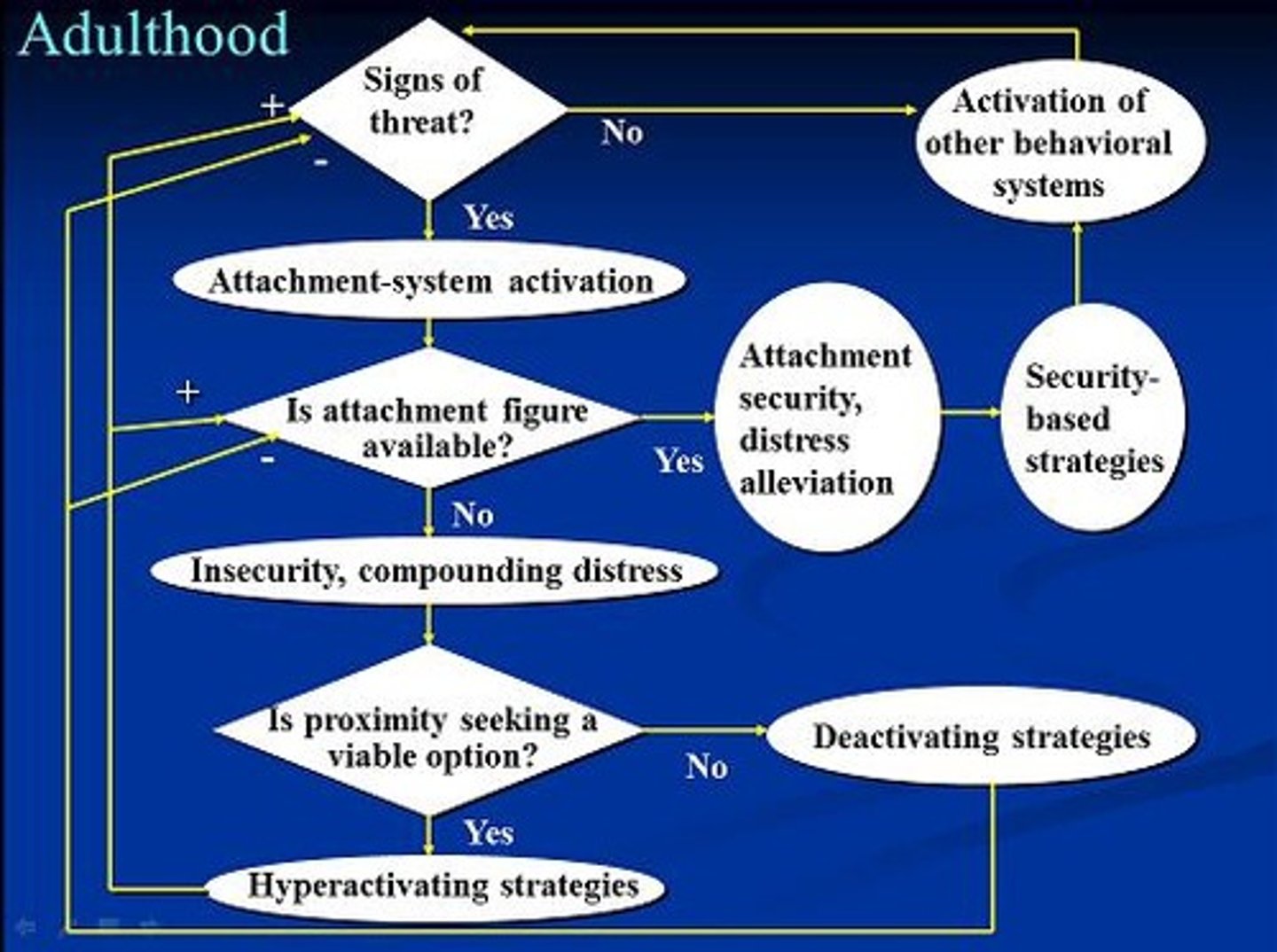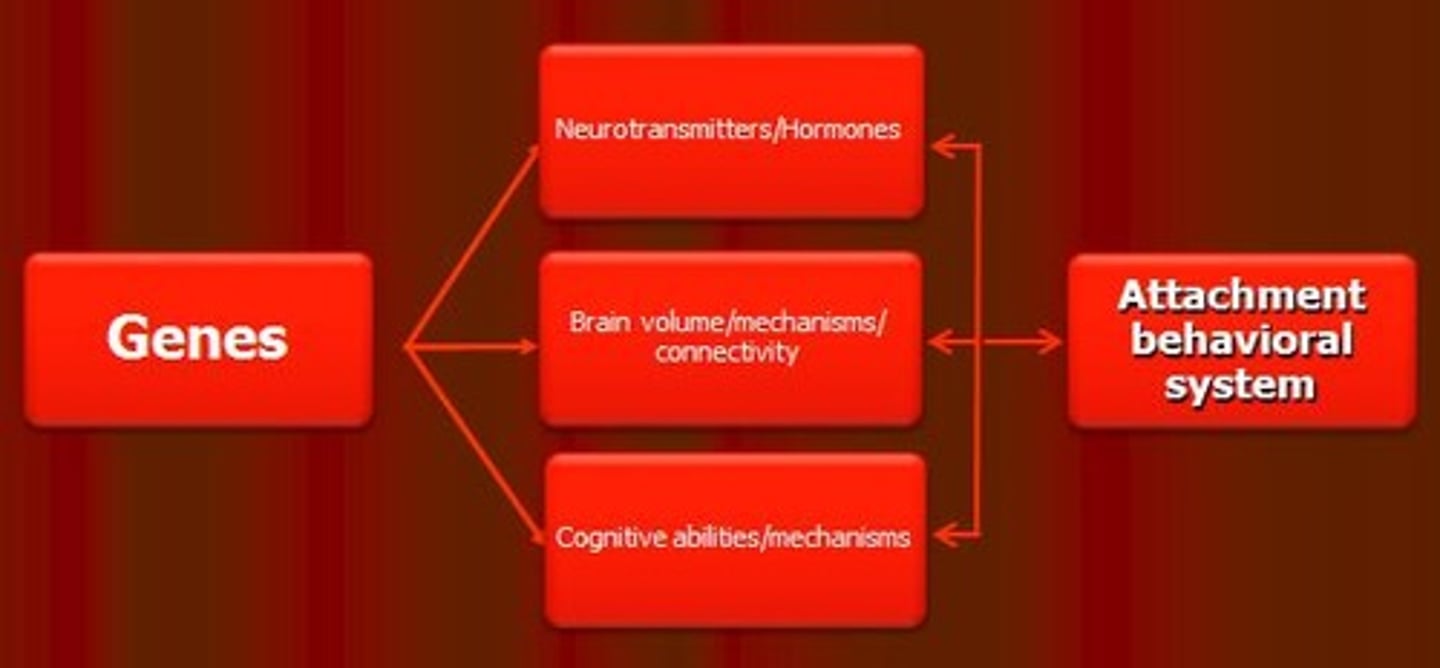Psyc 410 Midterm Study Guide: Intimate Relationships
1/43
There's no tags or description
Looks like no tags are added yet.
Name | Mastery | Learn | Test | Matching | Spaced |
|---|
No study sessions yet.
44 Terms
Attachment Theory
Framework explaining emotional bonds between individuals.
John Bowlby
Pioneer of attachment theory in psychology.
Mary Ainsworth
Contributed to attachment theory with empirical studies.
Strange Situation
Ainsworth's method to assess infant attachment styles.
Attachment Styles
Patterns of attachment behavior in relationships.

Secure Attachment
Characterized by trust and comfort in relationships.
Anxious Attachment
Involves fear of abandonment and clinginess.
Avoidant Attachment
Involves emotional distance and self-reliance.
Disorganized Attachment
Lack of clear attachment behavior in children.
Internal Working Models
Cognitive frameworks for understanding self and others.
Attachment Behavioral System
Innate system activated to seek proximity to caregivers.

Nature vs. Nurture
Debate on genetic vs. environmental influences on behavior.
Adult Attachment
Patterns of attachment behavior in adult relationships.
Phillip Shaver
Researcher in adult attachment theory.
Attachment Scripts
Cognitive templates guiding attachment-related behavior.
Attachment Q-sort
Method for assessing attachment through observations.
Self-Report Measures
Surveys assessing individual perceptions of attachment.
Adult Attachment Interview
Structured interview assessing adult attachment styles.
Projective Tests
Assess personality through ambiguous stimuli interpretation.
Hazan and Shaver Measure
Self-report tool for assessing adult attachment styles.
Attachment Stability
Consistency of attachment styles over time.
Major Life Transitions
Events influencing changes in attachment styles.
Priming
Technique to activate specific mental frameworks.
Oxytocin
Hormone linked to bonding and social behaviors.
Neuroimaging Studies
Research using brain imaging to study attachment.
Cultural Variability
Differences in attachment styles across cultures.
Gender Differences
Variations in attachment styles between genders.
Earned Security
Achieved attachment security through therapy or experiences.
Disorganized Attachment
Inconsistent behaviors indicating confusion in attachment.
Emotional Focused Therapy
Therapy addressing attachment issues in relationships.
Behavioral Systems
Interconnected systems influencing emotional and social behavior.
Attachment and Neuroscience
Study of brain mechanisms underlying attachment behaviors.

Rank Order Stability
Consistency of individuals' attachment styles relative to peers.
Mean Level Stability
Overall stability of attachment styles in a population.
Attachment in Adulthood
How childhood attachment influences adult relationships.
Attachment Measurement
Methods for assessing attachment styles in individuals.
Findings of Fraley et al. 2005
Study linking attachment styles to relationship dynamics.
Influence of Environment
External factors affecting attachment stability and change.
Therapeutic Interventions
Strategies to improve attachment security in clients.
Cultural Parenting Styles
Different approaches to parenting influencing attachment.
Attachment and Psychiatric Disorders
Link between insecure attachment and mental health issues.
Attachment Security Priming
Technique to enhance feelings of attachment security.
Attachment Across Age Groups
Variations in attachment styles throughout the lifespan.
Attachment and Rejection
How attachment styles influence responses to social rejection.